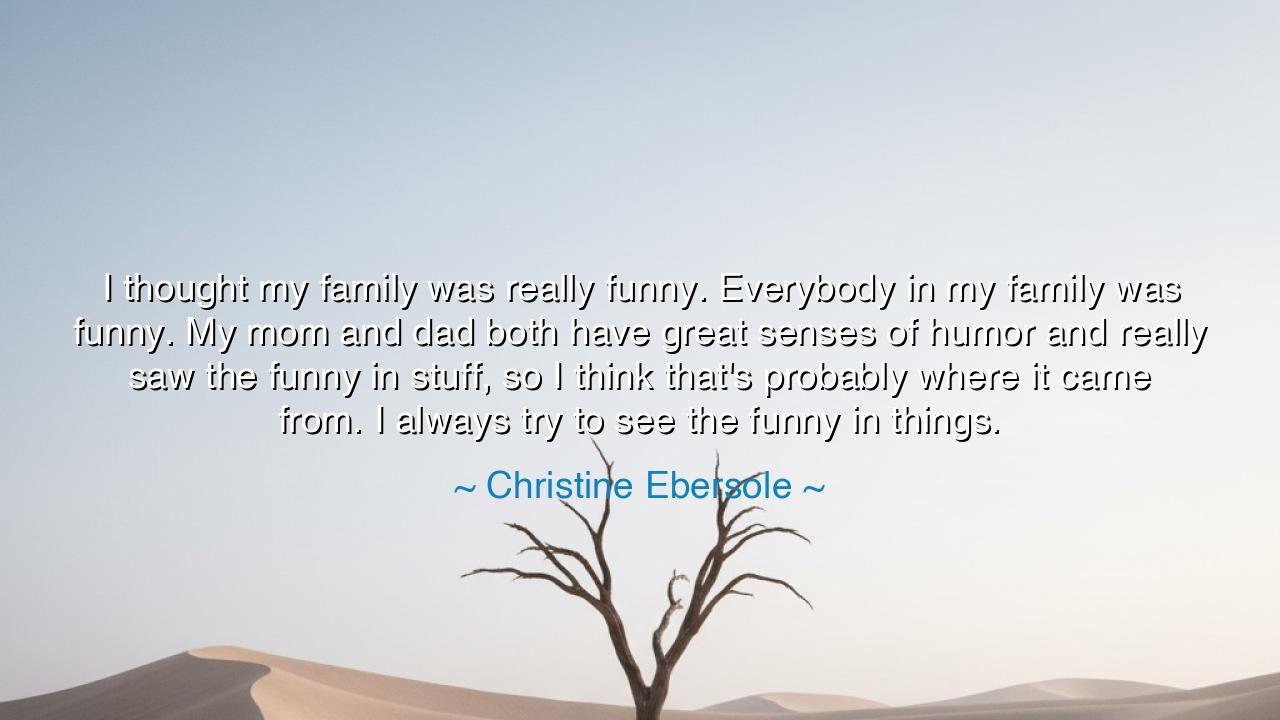
I thought my family was really funny. Everybody in my family was
I thought my family was really funny. Everybody in my family was funny. My mom and dad both have great senses of humor and really saw the funny in stuff, so I think that's probably where it came from. I always try to see the funny in things.






The words of Christine Ebersole shimmer with warmth and remembrance, like sunlight filtering through the laughter of generations: “I thought my family was really funny. Everybody in my family was funny. My mom and dad both have great senses of humor and really saw the funny in stuff, so I think that's probably where it came from. I always try to see the funny in things.” Beneath these simple words lies a great truth — that humor, born of love and shared humanity, is not a mere amusement, but a sacred inheritance, passed down like fire from one heart to another. It is the spark that turns sorrow into song, and chaos into light.
From the beginning of human time, when men huddled around the first fire and the night pressed close around them, laughter was the sound that defied the darkness. Ebersole’s humor did not rise from the stage or the spotlight — it rose from the hearth, from the everyday laughter of family, from the way her parents could turn hardship into a joke and confusion into joy. This is where the origin of her gift lies: not in training or artifice, but in the simple miracle of growing up among people who could look at life’s struggles and still smile. The ancient ones would call this the alchemy of the heart — the power to transform pain into laughter and fear into faith.
There is wisdom here, for those who listen deeply. The family that laughs together learns to see the world not as a storm to be feared, but as a river to be navigated with grace. When Ebersole says she tries to see the funny in things, she speaks of a way of living that is as ancient as the human soul. To find humor is to find perspective; to laugh is to remember that no burden, however heavy, is the whole of existence. The world has always honored warriors and kings, but those who could bring laughter into the hearts of others were the true healers — the ones who mended not bodies, but spirits.
Consider the story of Abraham Lincoln, a man who carried the weight of a divided nation upon his shoulders. Amidst war and tragedy, he was known for his dry wit and gentle humor. Once, when accused of being two-faced, he replied, “If I had another face, do you think I’d wear this one?” In that single jest lay courage, humility, and grace. Like Ebersole’s parents, Lincoln understood that humor is not escape — it is endurance. It does not mock life’s pain; it redeems it. Through laughter, he reminded his people that even in darkness, the human spirit could shine.
Ebersole’s reflection also reveals a deeper teaching: that the soul learns by imitation, and that what we grow around, we become. A child who witnesses humor used not to wound, but to heal, carries that vision into adulthood. The funny becomes a compass, guiding them through the tempests of life. As the philosopher Seneca once wrote, “It is not the things themselves that disturb us, but our judgment of them.” To see the funny in things is to judge with mercy, to give life the benefit of the doubt. It is to choose wonder over bitterness, joy over cynicism.
The lesson, then, is this: cultivate humor as you would cultivate courage. It is not a frivolous gift, but a form of wisdom — a daily act of resilience. When the world weighs upon you, seek the spark of laughter hidden within it. When others quarrel, be the one who softens the air with a smile. When failure finds you, laugh gently and rise again. For laughter does not deny sorrow; it transcends it.
And so, let the teaching of Christine Ebersole be carried forward: to see the funny in things is to honor the light within all living moments. It is to live as our ancestors once did — not by denying the night, but by laughing beneath the stars. Let humor be your inheritance and your offering, your shield and your song. For the one who can laugh sincerely, even through tears, carries within them an unbreakable soul — and becomes, like Ebersole herself, a bearer of joy to all who cross their path.






AAdministratorAdministrator
Welcome, honored guests. Please leave a comment, we will respond soon